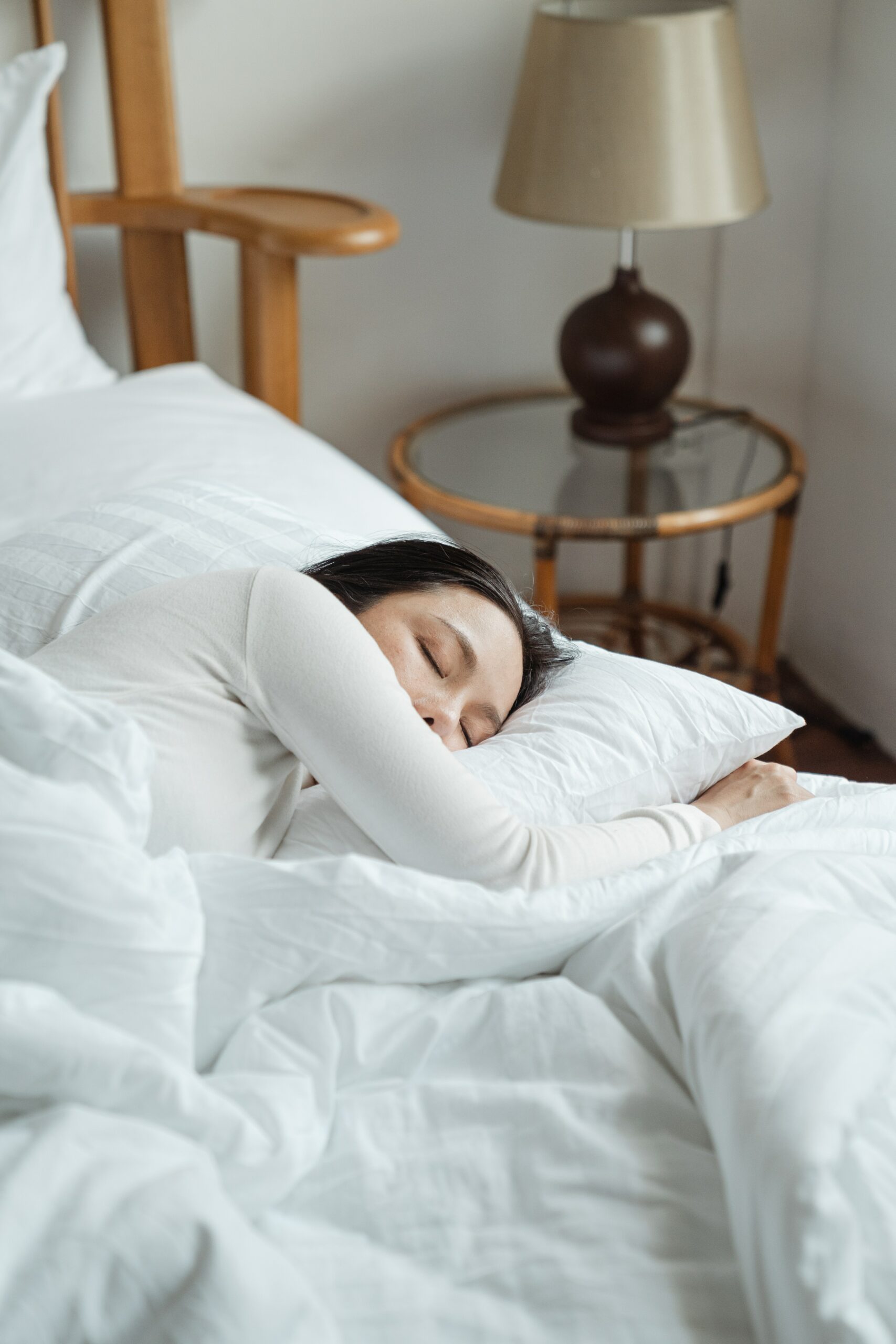Why Sleep Is Essential for Weight Loss
Suffering from sleep deprivation?
To read more tips and techniques for getting better and longer sleep subscribe to our newsletter

We find that at least half of our clients come to us feeling TATT — Tired All The Time. Whether it be difficult to nod off at the end of the day, to maintain a good deep quality sleep or constantly being woken throughout the night — you are not alone. Sleep expert, Matthew Walker, estimates ⅔ of us suffer from sleep deprivation.
Sleep and rest play vital roles in our overall health — they allow us to consolidate our memories from the day, repair our muscle tissue, and ultimately restore physically, emotionally and mentally. There is a wealth of research focused on the role sleep plays in learning, information processing, productivity and equally mental health, but what sleep also plays an essential role in our ability to manage our weight. The quantity and quality of our sleep helps with weight loss by having a direct impact on neurohormonal function and mood. This can consequently influence our hunger throughout the day and impact our physical performance when we exercise — ultimately impacting our ability to successfully transform our bodies.
Our unique four-pillar method — eat beautifully, workout intelligently, think successfully and live well — is built on a foundation of high-quality restorative sleep. Arguably, sleep and rest is rudimental for all other healthy habits in our method to be formed. Understandably, think about how you feel after a restless night. Fatigued? Irritable? Lethargic? Hungry? How inclined are you to make beautiful food choices, smash a workout or think clearly with your body transformation goals in mind?
Probably not very much! In contrast, think about how you feel after a good night’s sleep. Energised? Refreshed? Ready for whatever the day throws at you?
It’s a no-brainer.
So make ceremony of your bedtime routine – get into your cozy pajamas, light a candle, get your nose into that book you’ve been wanting to crack open and let the stresses of the day melt away. In this post, we take an in-depth look at the relationship between sleep and weight loss to show you how your lack of sleep may be holding you back from your body transformation goals.
How Does Sleep Affect Weight Loss?
Do you exercise most days? Do you consistently eat well and make conscious positive food and lifestyle decisions but still find yourself unable to truly transform? Before you gear up your exercise routine or cut calories, take a moment to consider your sleep patterns. Between living your life, exercising, working and getting through your daily tasks, you may be neglecting sleep — it can feel like there just aren’t enough hours in the day. Yet the correlation between quality sleep and effective weight loss are innumerable, and it may be that your lack of restful, tranquil and restorative sleep is the reason you’ve been unable to achieve — let alone stick with — your body transformation goals.
Here are some of the many ways that getting the right amount — and quality — of sleep can positively affect your weight loss goals:
Taking Control of Your Appetite with Sleep
Sleep helps promote weight loss by directly regulating hormones that play a role in appetite and mood. Promises of the elusive willpower that will transform our bodies and lives overshadow all else, leaving little appreciation of the large role hormones play. A recent study found that sleeping less than six hours a night triggers the area of the brain that increases your need for food and weakens the brain’s ability to tell when you’re full.
When we’re sleep deprived, our bodies release an excess of ghrelin, otherwise known as “the hunger hormone”. This triggers a vicious cycle where the less you sleep, the more ghrelin you produce and the hungrier you feel. Likewise, lack of sleep decreases our levels of leptin, also known as “the satiety hormone”. This hormone signals to our brains when we are full and can stop eating. As a result of these two hormonal fluctuations, it’s no wonder we feel hungrier and are less satisfied when we feel tired. This makes it more difficult for us to make positive decisions about food and instead, we may opt for something loaded with sugar for a quick energy boost.
Despite how motivated and committed you are to your goals, without proper rest, your hormones may work against you and make it harder for you to lose weight. For effective weight loss, you need the right balance of both ghrelin and leptin, which means sleep is essential.
Busting Stress with Sleep
Sleep duration and sleep quality also affect other areas of hormone production necessary for weight loss and overall health, including glucagon, catecholamines, growth hormones and insulin. But perhaps most troubling of all, lack of sleep encourages your cortisol — the stress hormone — levels to rise.
Stress is associated with many negative health effects, including contributing to weight gain or difficulty in effectively losing weight. When you’re stressed, cortisol increases and activates the reward centre in your brain, which increases food cravings and puts your body into a state of fight-or-flight, which can also effect the exercise you do. A study by the Kaiser Permanente Center for Health Research in the US monitored the relationship between sleep, stress and sticking to weight loss goals, revealing the mutual relationship between all three. The results showed that people who had less than six hours of sleep were less likely to achieve their weight loss than those who enjoyed between six and eight hours a night.
Firing up Metabolism with Sleep
Have you ever noticed how lethargic you feel after a restless night? It turns out that it’s not just your brain and body that become slow and sluggish after a bad night’s sleep; your fat cells do too. Researchers at the University of Chicago found that after only four days of poor-quality sleep, the body enters a phase of “metabolic grogginess”, in which your body is unable to properly control blood sugar levels. In fact, the research found that sleep deprivation significantly reduces your body’s ability to respond to insulin by a staggering 30%, whereby insulin is one of the hormones that regulate your blood sugar. So how does this relate to weight loss?
When you’re unable to adequately respond to elevated blood sugar levels, your pancreas increases the amount of insulin secreted to ultimately try to reduce your blood sugar and limit damage to your blood vessels. However, if the cells in your body do not respond to insulin, your pancreas tries to increase the amount of circulating insulin in your blood to try to compensate, which can eventually lead to sugars being stored as fat in your fat cells.
Working out Effectively with Sleep
Exercise is integral to a healthy lifestyle — not only does it encourage mobility, boost your energy and keep your body functioning optimally, but it also builds your lean mass including your muscles. When your muscles get the rest they need to repair and grow, this has a direct impact on the amount of energy you burn at rest. Put simply, the more muscle you have, the more energy you burn in a day and the higher your metabolism.
Research has found that lack of sleep decreases protein synthesis — your body’s muscle-making process — which causes both muscle loss and slower recovery times. When you’re tired, you struggle to produce the growth hormone, which helps with fat loss, anti-ageing and muscle recovery. All the extra cortisol pumping through your body after a restless night leads to a drop in production of the growth hormone, which makes you feel tired, worn out and less likely to exercise! Likewise, studies show that sleep deprivation increases your risk of injury during a workout.
Your Night-Time Routine
Knowing the importance of sleep to weight loss, it may be time to implement some changes to your night-time ritual. First of all, we need to establish how many hours of sleep you need each night to effectively lose weight. We encourage all of our clients to aim to sleep for at least six hours every night, and if you can, sleep even longer — what we call “super sleep” at least once a week. Remember, the better you sleep, the more effectively you train, the more beautifully you eat and the more successfully you think — it truly is the foundation of success in our four pillars.
Committing to rest may not sound challenging, but our hectic lives can make finding time to sleep and relax difficult. Here are our top tips for catching up on those ZZZs:
Do a Digital Detox
Firstly, our “screen curfew” is highly recommended. Whether you’re up late on your phone, watching TV or browsing on your laptop, the screen light on your devices stimulates your brain by reducing the natural sleep-wake cycle hormone – called melatonin – which typically helps you feel drowsy, thus making it harder for you to nod off.
An hour before you go to sleep, do a digital detox and switch off from the day. Be ruthless with your devices — put your phone on silent preferably out of the bedroom . Out of sight, out of mind. The same goes for tablets, TVs and laptops. Use the time to dig into that paper book you’ve long wanted to read.
Create a Bedroom Sanctuary
Treat your bedroom like a sanctuary; it’s a place of rest. Dim the lights, light a candle, splash out a pillow spray, play some soothing music and keep the bedroom temperature regulated. Make your bedroom a haven — whatever your tastes or preferences — from which you can escape from the daily grind and indulge in some total relaxation and restoration.
Take Time to Pamper Yourself
There’s nothing quite like a warm shower or bath to prime you for rest. A classic recommendation to get your body ready for a deep restorative sleep is by having your room cool and lowering your body temperature, and on that same note, when you take a hot bath or shower before bed this heats up your body to eventually kickstart your brain to cool your body, which then helps you fall more naturally into sleep. To elevate your bathing ritual, invest in products that lift your mood and deliver powerful physical benefits. Epsom salts in the bath are rich in magnesium and help the muscles relax to ease you into sleep, while indulgent essential oils like lavender and neroli are wonderful when added into a bath or mixed with your body oils and moisturisers.
Physically Unwind
When we’re stressed, we carry it in our bodies. Have you noticed how your shoulders are hunched, your jaws clenched and your brows furrowed after a particularly long day? Untangle those knots and release the tension by taking some time to gently stretch before getting into bed.
As with anything, rest takes practice. You may struggle to commit to no phones in the bedroom or miss your daily evening Netflix binge at first, but over time, it’ll feel easy and natural. To learn more tips and techniques for getting better and longer sleep to aid your weight loss goals, contact us today.
& More
Receive 10 free recipes to your inbox!
Sign up and we will send you 10 free recipes






